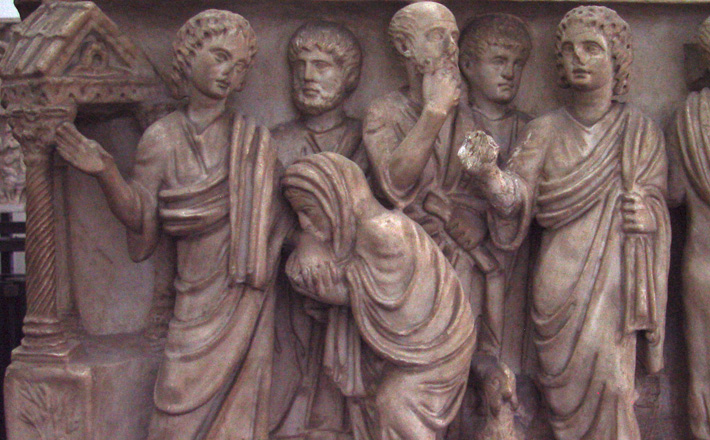Commentary on Isaiah 58:9b-14
Isaiah 56–66, so-called Third Isaiah, addresses the post-exilic community struggling to make a new life in Jerusalem during the 530s and 520s BCE.
Rebuilding the temple and the city was moving slowly, perhaps stalled completely. Leadership within the community was contested. Divisions and violent quarreling hindered progress in both physical and social restoration. Drought and food shortages exacerbate the social strife and made rebuilding difficult. Economic and social inequity — homelessness, hunger, lack of clothing — threatened the stability and identity of the returned community.
Groups outside the Judean community regarded the returnees with suspicion, and the returnees disagreed about how welcoming to outsiders the community should be. Texts composed around this time testify to this tension. Ezra-Nehemiah represents an exclusivist position; Third Isaiah and Ruth promote an inclusive viewpoint. Second Isaiah (chapters 40–55) had promised a glorious return and restoration of the community. Third Isaiah speaks a word of correction and hope in the less-than-glorious situation the Judeans actually faced.
The eight verses preceding Isaiah 58:9b–14 provide essential literary context for interpretation. Chapter 58 as a whole focuses on the proper disposition of the community toward both God and neighbor. The prophet condemns those who assume that frequent worship and obsequious rituals will persuade God to help them. Such self-involved worship sours and curdles into insincere gestures of pious theater. This sort of self-interested worship amounts to hugging God and hoping for a cookie.
“The Fast I Choose”
Isaiah 58 might well be titled, “The Fast I Choose” (58:6). The theme of food and hunger pervade the chapter. Fasting was evidently a common practice at the time, but only among those with enough food. The poor fast by necessity. The fast God “chooses” is, ironically, to provide food for the hungry and thereby to enable them to break their enforced fast.
Other things necessary to a decent life must be supplied as well: freedom from economic oppression and injustice (verses 3, 6, 9), clothing and housing (verses 7, 12), and neighborly kindness instead of personal attacks (verses 4, 9b, 13). God’s chosen fast — providing life’s necessities for all — wins God’s attention (verse 9).
The invitation to “remove the yoke from among you” should be interpreted in light of verse 6 where it symbolizes injustice and oppression. “The pointing of the finger, the speaking of evil” likely provide specific examples of injustice and oppression. The powerful use false accusations and slander to deprive those of lesser status of their rights and property (see 1 Kings 21). Such oppressive behavior is forbidden, but refraining from oppressing the weak is not enough. The audience is called to raise them up, to feed the hungry and provide life’s necessities for the afflicted (verse 10).
God’s demands are clear, but our anxious desire to secure our own lives, even when it requires that others suffer, make obedience challenging. It’s easy to fast when you know your cupboards are full; the challenge is to empty your cupboards to meet the needs of others and then trust God to “satisfy your needs in parched places.”
More than food is necessary for a stable life, however. Without walls and houses and streets, life is insecure and chaotic. In this respect, the entire community stood in need. God promises the restoration of their city, the shalom of urban renewal. The work is theirs to do, as well as the honor of having done it: “You shall be called the repairer of the breach, the restorer of streets” (58:12). Determining how these words might apply to God’s people today needs little imagination, only a willingness to see what is broken and to begin the work of rebuilding, block by block.
The Moral Imperative of Sabbath Rest
In light of the author’s attack on insincere worship in the first half of chapter 58, the description in verse 13 of proper observance of the Sabbath is at first surprising. The author is not opposed to worship per se, only to the hypocrisy of worshiping God while ignoring the needy. Such insincere worship amounts to “trampling the Sabbath” (compare Isaiah 1:10–17; Amos 5:21–24).
Indeed, honoring the Sabbath involves not worship but caring for those at the bottom of the social ladder, as Jesus’ argument in Luke 13:15–16 shows. The Decalogue makes clear that the purpose of the Sabbath is to grant a day of respite to the underclass (Deuteronomy 5:12–15). As Jesus notes in Mark’s gospel, “The Sabbath was made for humankind, and not humankind for the Sabbath” (2:27).
Jubilee and Urban Renewal
Themes related to the Year of Jubilee punctuate 58:9b–14. Jubilee was designed to restore economic equity to the structures of society that, then as now, become distorted over time, shifting wealth and power into the hands of a few (see Leviticus 25). Significantly, our text is structurally and thematically similar to the announcement of the Year of Jubilee in 61:1–4.
The thematic structure of both texts moves from relief for the poor the hungry and the oppressed to the promise of security and flourishing (garden/tree symbols) and ends with a promise of honor for those who rebuild the ruins of the city and make it livable (verse 12). Salvation is here and now; it is incarnate in human action. The restoration of the people as a community depends on the restoration of the infrastructure upon which the goodness of its common life depends.
Although rebuilding the ancient ruins is a repeated theme in both chapter 58 and 61, it is surprising that neither mentions rebuilding the temple, a task of great importance to the returnees. Perhaps in the view of the writer of third Isaiah, worship, fasting and rituals of abasement — temple-focused acts — had been overemphasized, whereas too little attention had been paid to the physical and social structures that make possible communal shalom. The blessing for not following one’s own selfish interests on the Sabbath will be to “ride upon the heights of the earth,” an exaltation contrasting sharply with rituals of abasement describe at the beginning of the chapter.


August 25, 2013